Innovation is crucial for addressing the complex challenges of sustainability, and collaboration between researchers and practitioners plays a vital role in driving sustainable innovation.
The 2nd International Workshop on Global, Sustainable Innovation, held at InnoLab, University of Vaasa on 22-23 May 2023, brought together experts from around the world together with our CIMR Director Helen Lawton Smith, our CIMR Deputy Director Federica Rossi, and CIMR members Muthu De Silva and Emma Palmer Foster, to discuss the drivers of sustainable innovation and the role of universities and other actors in advancing sustainability transitions.
The event was also a great occasion for our CIMR team to meet with our international partners, namely Professor Tomasz Mroczkowski from the Kogod, American University and Professor Martin Meyer form the University of Vaasa, who kindly hosted this event.
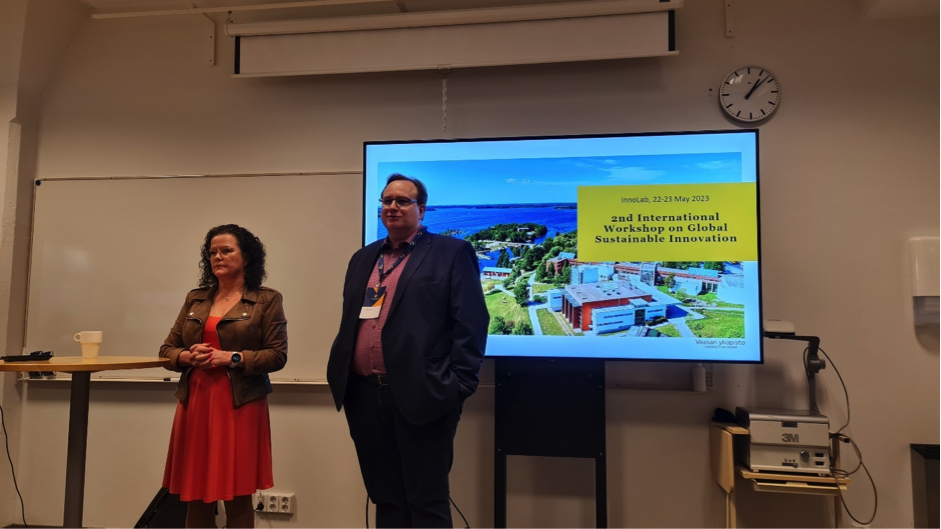
With this blog post we highlight some of the key insights from the workshop.
Complexity in Sustainability Transitions
Jouni Juntunen from InnoLab and the School of Technology & Innovations at the University of Vaasa shed light on the structural and institutional complexity involved in energy transition. Understanding the intricate dynamics and interdependencies within sustainability transitions is essential for effective policymaking and decision-making.
Changing Role of Universities
Helen Lawton Smith, our CIMR Director, focused on the evolving role of universities in inclusive entrepreneurial ecosystems. She emphasized the importance of universities as catalysts for sustainable innovation and their potential to bridge the gap between academia, industry, and society.
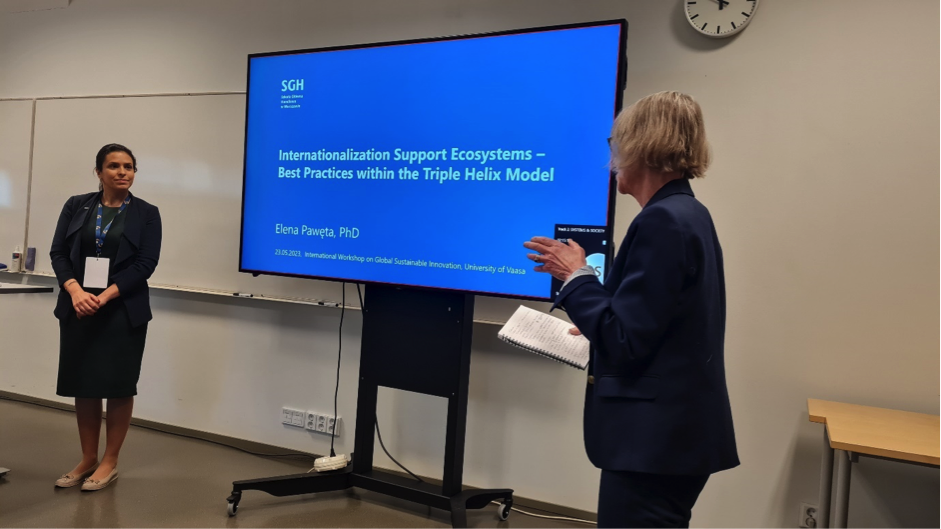
Impact of Collaborations with Arts and Culture Organizations
Federica Rossi, our CIMR Deputy Director explored the impact of collaborations between universities and arts and culture organizations. Such partnerships have the potential to drive innovative solutions, engage diverse stakeholders, and foster creative approaches to sustainability challenges.
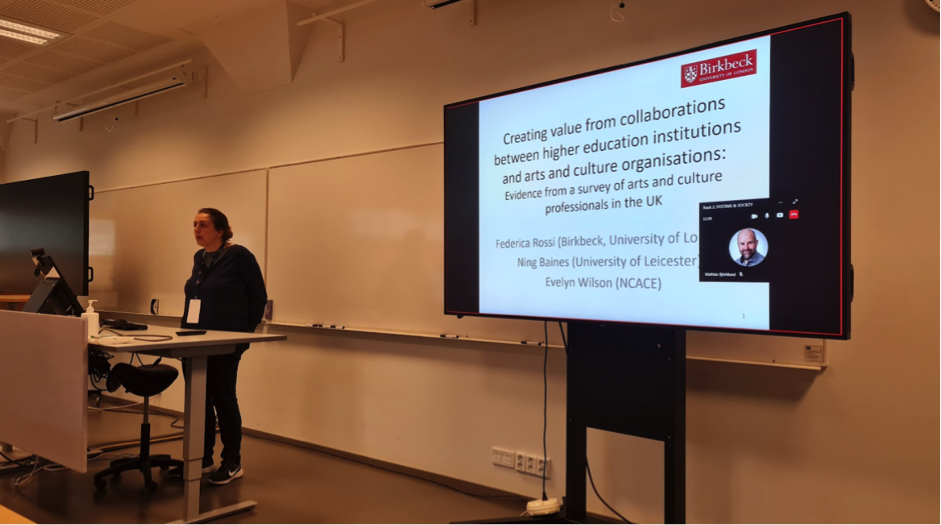
The Role of AI in Sustainability Transitions
Tomasz Mroczkowski from the Kogod School of Business at American University discussed the role of artificial intelligence (AI) in sustainability transitions. AI-powered technologies have the potential to revolutionize various sectors, enabling more sustainable practices, resource optimization, and informed decision-making.
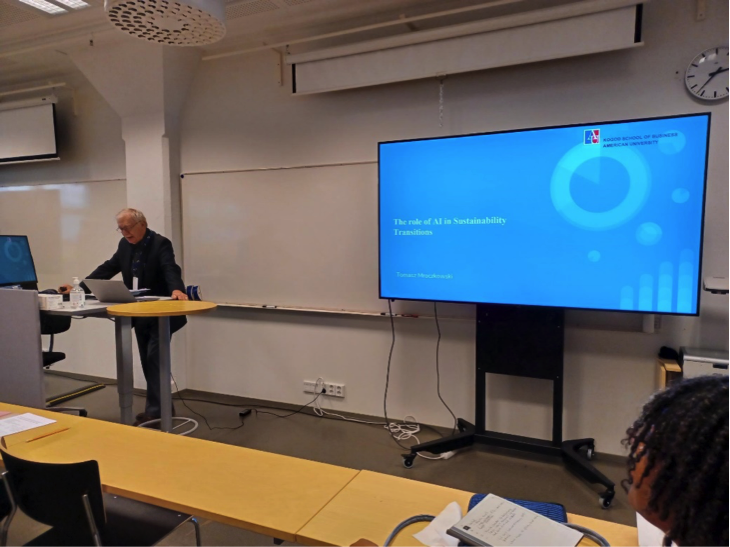
Media Representations and Industry Emergence
Brett Anitra Gilbert, the Regional Innovation Chair at the Kogod School of Business, delved into the co-evolution of radical technologies, specifically focusing on media representations of fuel cell technology and its implications for industry emergence. Understanding how technologies are portrayed in the media can influence public perception, policy decisions, and ultimately, the adoption of sustainable innovations.
Efficient interdisciplinary co-creation.
Muthu De Silva presented her work with OECD colleagues, Dr Caroline Paunov and Nikolas Schmidt on interdisciplinary co-creation as a means to solve complex socio-economic challenges. Traditionally, interdisciplinary co-creation has been seen as less efficient and more appropriate for long-term goals. However, the COVID-19 pandemic has demonstrated that rapid interdisciplinary co-creation is possible. The study – by analysing 30 case studies from 21 countries – provides a new perspective on interdisciplinary co-creation as an efficient approach to addressing major challenges.
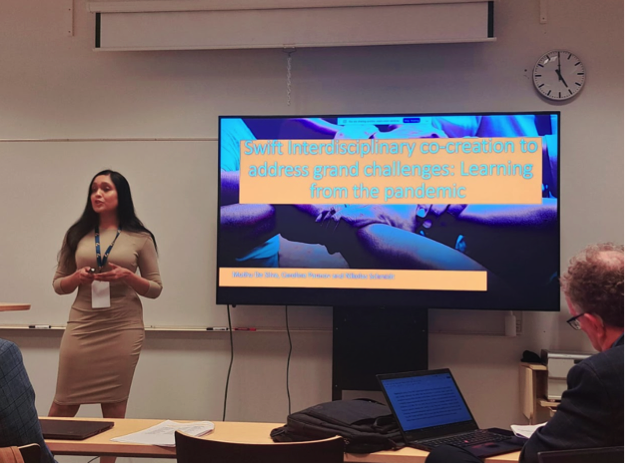
Boundary-Spanning Business Schools and Sustainable Innovation
Martin Meyer from InnoLab highlighted the importance of boundary-spanning business schools in promoting sustainable innovation. These institutions play a crucial role in fostering interdisciplinary collaborations, engaging with industry partners, and equipping future leaders with the knowledge and skills necessary for driving sustainability transitions.
How bioscience park stakeholder diversity affects regional innovation
Birkbeck PhD student and CIMR member Emma Palmer Foster discussed the theoretical lenses she is exploring in order to address this research question. Bioscience park stakeholders’ power, legitimacy and urgency and their effects on regional innovation systems will be explored via longitudinal case studies. This particular sub-sector of science parks has been given minimal consideration in the literature, despite the global impact of the biotech sector, and Emma hopes her research will bring new insights to the literature and policy making.
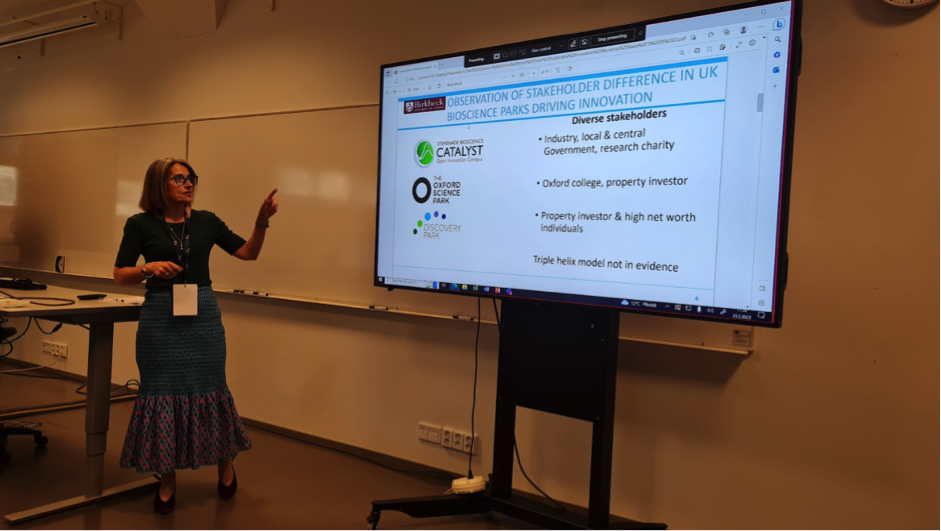
Global Value Chains and Sustainability
Zaheer Khan from the University of Aberdeen and InnoLab explored the connection between global value chains and sustainability. Understanding how value chains operate and incorporating sustainability considerations into their design can help create more resilient and environmentally conscious systems.
Inspiring Innovations
Darren Dalcher from the National Centre for Project Management at Lancaster University Management School and InnoLab led a discussion among practitioners. By fostering dialogue between researchers and practitioners, this session aimed to inspire innovative solutions and highlight the practical implications of sustainable innovation.
Conclusion about the event
The 2nd International Workshop on Global, Sustainable Innovation at InnoLab, University of Vaasa, provided a platform for researchers and practitioners to exchange insights and ideas on driving sustainability transitions. The diverse range of topics discussed, from complexity in sustainability transitions to the changing role of universities and the impact of collaborations, highlighted the importance of multidisciplinary approaches and collaborative efforts in achieving a more sustainable future.
Our CIMR community would like to thank again Martin Meyer and the University of Vaasa for their warm welcome and for hosting this event. Helen Lawton Smith, Director at CIMR, comments about the event:
“At the heart of the workshop event, the spirit of collegiality prevailed, fostering respect for individuals at all stages of their academic journeys. Each participant was provided with a dedicated discussant who fearlessly challenged our ideas and methods, igniting intellectual growth. Amidst the enriching discussions, we also enjoyed delightful moments of social bonding. Through forging new connections and strengthening existing ones, we emerged from the workshop with a shared vision, ready to embark on a journey of planning the future alongside our esteemed partners.”
Looking forward to joining more international events in the near future!
Reports and research discussed during the event:
- De Silva, Muthu and Lavelle, O. and Schmidt, N. and Paunov, C. (2022) Co-creation during COVID-19: 30 comparative international case studies. OECD. ISSN 2307-4957.
- De Silva, Muthu and Schmidt, N. and Paunov, C. and Lavelle, O. (2022) How did COVID-19 shape co-creation? Insights and policy lessons from international initiatives. OECD. ISSN 23074957.

